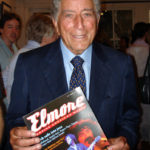Photos by Mark Longthon
Among the many excellent places to hear music in the Capitol district, the Egg, in the Empire State Plaza, rests comfortably near the top. Intimate yet roomy, the acoustics stand second to none in a district that’s home to the legendary Troy Savings Bank Music Hall (1870) and the state that boasts Carnegie Hall (1891), both venues heralded for their sound long before the invention of the microphone. Martin Sexton gave his audience a lengthy demonstration of the Egg’s capabilities, using his extraordinary pipes and vocal percussion both mic’ed and an unmic’ed for a couple of magical sets.
Calling himself as his own opening act, Sexton performed two complete sets, starting with his very own version of “America The Beautiful,” unmic’ed. Describing it as a prayer, he ended with “Amen,” drawing laughter from the crowd in this state capital, just weeks from an election day. At one point Sexton said, “I love this room, it’s like playing in a living room.” I agree; the Egg seats are certainly more comfortable than the one I’m perched in right now.
Sexton interacted with the audience regularly, talking to us and enlisting choruses from the house. At one point he said, “Can anybody help me out….” and people started shouting song titles, to which Sexton replied, “I don’t mean with the set list!”
With plenty of original material in his repertoire, Sexton also famously does what one might loosely terms “covers,” meaning he freely reinterprets a song (most generously the melody, but sometimes the lyrics, too), and mashes it up with “covers” of other songs as well. In once instance he began with the Beatles’ “Mother Nature’s Son,” morphed into his own “There Go I,” then Van Morrison’s “Moondance,” which wound up partnered with Joni Mitchell’s “Woodstock.” Prince, Pink Floyd, the Doors, Ten Years After, Mark Ronson/Bruno Mars, Lou Reed and George Harrison also made appearances by proxy. As photographer Mark Longthon said, “He’s like a juke box—plug him in and let him go!”
Among the many highlights, Sexton’s own songs really delighted this reviewer: the poignant “Black Sheep,” his own “Hallelujah” (not the Leonard Cohen song), which brought tears to my eyes, and the finale, “The Way I Am,” on which he sings, yodels and puts every earthly singer on notice: This is what songs will sound like in Heaven.
—Suzanne Cadgène







Be the first to comment!